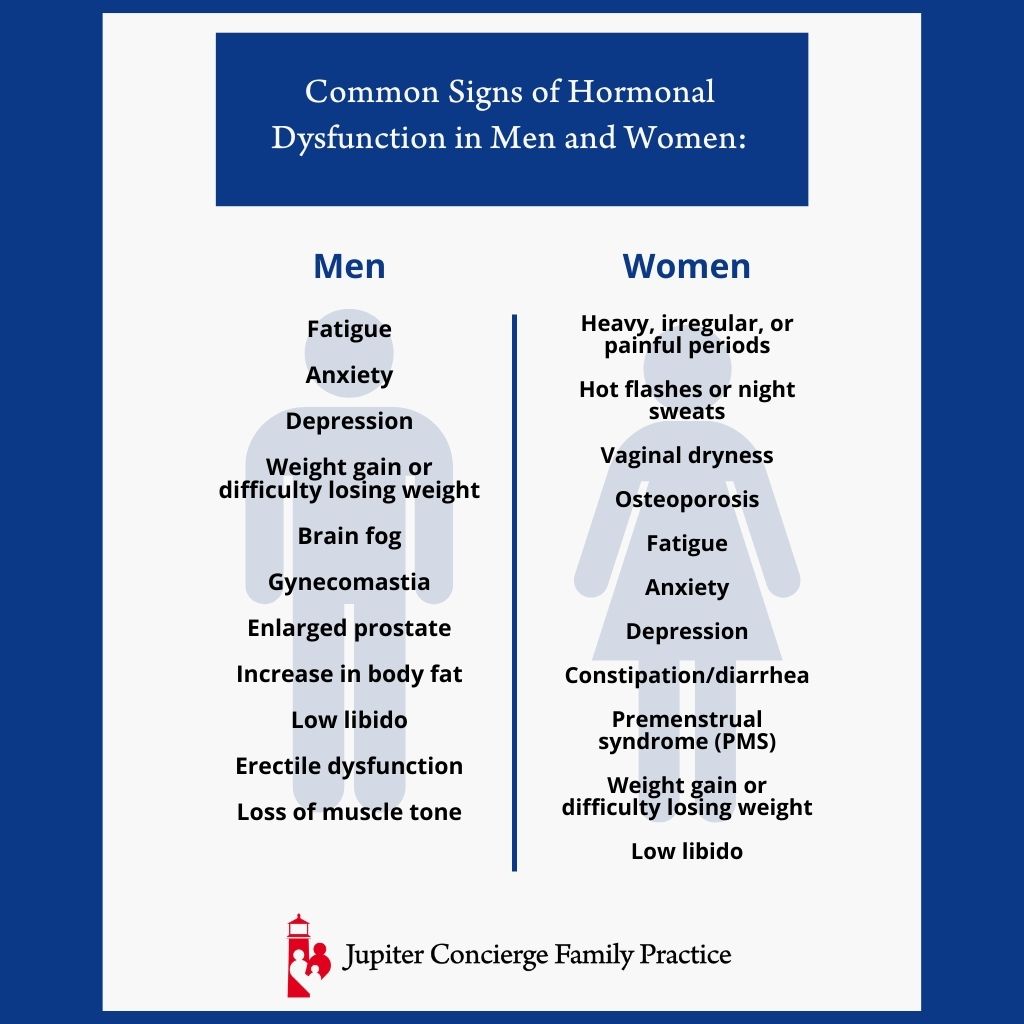
Human sex hormones can change or decline due to many factors, resulting in symptoms that can interfere with a person’s lifestyle.
Hormone replacement therapy is a popular method of addressing these changes, but it isn’t the only method — or even the most important one.
In this post, I’ll talk about pharmaceutical hormone replacement therapy, when it’s helpful, and what other steps patients can take to help recalibrate their hormonal levels.
First, let’s look at why hormone production becomes deficient in the first place.
He, She, and Hormones
Though it may be strange to hear, all human beings — male and female — make the same three sex hormones: estrogen, progesterone, and testosterone. We simply produce them in different amounts and combinations.
For example, women’s higher levels of estrogen and progesterone result in menstruation, pregnancy, lactation, and menopause. In other words, these differing hormonal combinations give rise to characteristics commonly defined as “male” and “female.”
Beginning around age 45 — or sometimes even earlier — the production of sex hormones changes. In women this is usually due to menopause, the end of a woman’s reproductive years. Menopause can be initiated by a total hysterectomy (surgical removal of the uterus and ovaries), which may happen at any age, depending upon the medical necessity that drove it. Other times, menopause occurs as a natural end to menstruation.
In men, hormonal deficiency is due to the underproduction of testosterone that occurs with age. Men may also experience relatively high estrogen levels when testosterone converts to estrogen excessively.
In both women and men, hormonal deficiency can be the result of poor lifestyle choices as well as illness. Estrogen receptors are all over the human body, so abnormal amounts of hormones or hormone-like toxins (xeno-estrogens) can result in many disease states.
Regardless of the cause, when hormonal dysfunction occurs, symptoms occur too. So what are the signs you need hormone replacement therapy, or one of its alternatives?
Common signs of hormonal dysfunction in men:
- Fatigue
- Anxiety
- Depression
- Weight gain or difficulty losing weight
- Brain fog
- Gynecomastia
- Enlarged prostate
- Increase in body fat
- Low libido
- Erectile dysfunction
- Loss of muscle tone
Common signs of hormonal dysfunction in women:
- Heavy, irregular, or painful periods
- Hot flashes or night sweats
- Vaginal dryness
- Osteoporosis
- Fatigue
- Anxiety
- Depression
- Constipation/diarrhea
- Premenstrual syndrome (PMS)
- Weight gain or difficulty losing weight
- Low libido

Hormone replacement therapy (HRT) is one answer to the question of how to manage unpleasant and disruptive symptoms of hormonal dysfunction. Hormone replacement therapy may include compounded, plant-sourced, and synthetic hormones, and it comes in many forms, including:
- Pills
- Troche (lozenge-like dissolvables)
- Creams (topical, intravaginal)
- Patches
- Drops
- Injections
- Implantable pellets
- Edibles (herbs, soy)
Hormone replacement therapy may be the right choice for you, but it’s not the first and only option. A full medical history, physical exam, and lab tests will help determine whether hormone replacement therapy is the optimal choice.
The 4 Pillars of Health and Hormones
Hormone replacement therapy may indeed be the right choice, but a review of the 4 Pillars of Health — nutrition, exercise, sleep, and stress — can point to root causes of hormonal dysfunction.
There’s a complex and powerful interaction between ovaries/testes, adrenals, thyroid, brain, gut (microbiome), liver (detox), insulin, and inflammation. Everything causes everything. To restore optimal functioning, therefore, we have to take a much broader view than just your estrogen or testosterone levels.
Nutrition
Alcohol, caffeine, fat, and sweets are all major contributors to hormonal dysfunction. Alcohol affects liver enzymes, hindering body detoxification and the conversion and processing of hormones. Caffeine stimulates cortisol — an adrenal hormone — that knocks off hormonal balance. Obesity, with its increased fat tissue, contributes to estrogen conversion issues.
Foods contaminated with pesticides and added hormones can contribute to hormonal dysfunction. Eating organic and locally produced vegetables and meat products is a good way to limit your exposure to these disruptive factors.
Exercise
Exercise is important to stave off excess fat and obesity. However, there’s a limit. Too much exercise can stunt hormones in women. A balanced exercise regimen is preferable to one that disrupts hormone production.
Sleep
Inadequate sleep directly affects cortisol levels, which then influence your body’s production of sex hormones. Appropriate sleep is critical for balanced hormone production and regulation.
Stress
Remember, there are three kinds of stress — emotional, food, and hidden — and each type can disrupt hormonal balance. Emotional stressors can be things like divorce, the death of a loved one, depression, anxiety, changing careers, and moving. Food stressors might be nutritional deficiencies, gluten and/or dairy intolerance, or food allergies.
Hidden stressors include underlying disease you may be unaware of, or unintended exposure to toxins and pollutants. For example, conventional plastics often contain endocrine-disrupting agents, such as phthalates or bisphenol A (BPA).
Natural Treatments for Hormonal Dysfunction
Making the 4 Pillars the cornerstone of a healthy life can improve your hormone production and functioning. A few ideas here may help you self-regulate.
Nutrition — Get your diet dialed in. Eat organic foods, seek out low-mercury seafood, drink filtered water. Cook in stainless steel, glass, cast iron, or enamel. Avoid non-stick, coated cookware. Consider evidence-based nutritional supplementation based on your physician’s recommendation.
Exercise — Develop an appropriate movement practice. This will help regulate blood sugar levels and reduce stress.
Sleep — Create a dependable, relaxing sleep routine to cue your body that it’s time to get some rest.
Stress — Reduce the emotional stressors you’re aware of, and try meditation for those you can’t eliminate from your life. Identify and replace environmental pollutants, such as cosmetics and household cleaners, with organic standard versions.
Hormone Replacement Therapy and the 4 Pillars
If you notice some of the signs above and believe you need hormone replacement therapy, speak with your physician.
Sometimes adopting healthful habits in the 4 Pillars — nutrition, exercise, sleep, and stress — is sufficient to improve or resolve your hormonal production problems without the use of pharmaceuticals. However, sometimes hormone replacement therapy is necessary to help get your health onto the right track.
Sometimes, a combination of both will serve you best. If you do begin hormone replacement therapy, you’ll likely see better results more quickly when it’s part of an overall healthy lifestyle.

Dr. David Rosenberg
Dr. Rosenberg is a board-certified Family Physician. He received his medical degree from the University of Miami in 1988 and completed his residency in Family Medicine at The Washington Hospital in Washington, Pennsylvania in 1991. After practicing Emergency Medicine at Palm Beach Gardens Medical Center for two years, he started private practice in Jupiter, in 1993. He is an avid baseball fan and Beatles fanatic, since he was 8 years old. He has been married to his wife, Mary, since 1985 and has three grown children.
David completed additional studies at Mercer University, Macon, Georgia and obtained a BS in Chemistry in 1983.
“My interests include tennis, snow skiing, Pilates and self-development.”
